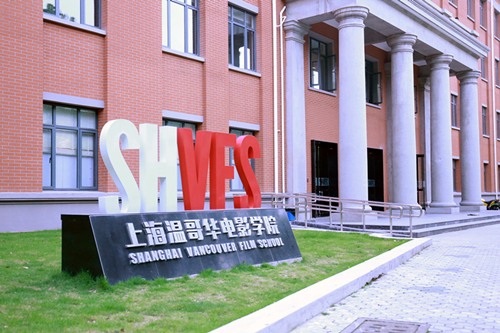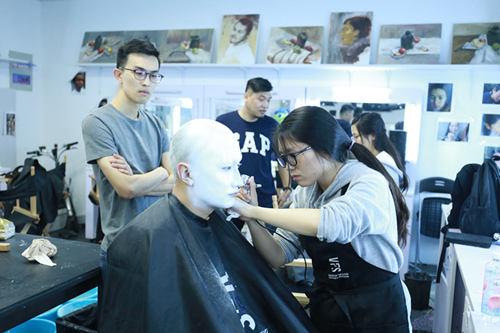The Anniversary of Vancouver Film School in Shanghai



□By Chen Hong
The elevator at the teaching building offers direct access to the third floor, however, Wang Xiaofeng, who has been studying here for over 8 months, had never been to the third floor before our journalist made an appointment to interview him. “I have no spare time. We have only 1 year, which is divided into 6 terms, and our study intensity is 4 times that of ordinary universities,” said he. The school, which is the product of the new film policy of Shanghai, including the educational system, is fully geared to the international convention and is intended to cultivate practical technical talent urgently needed for China’s film industry.
Original intention of the school:
to leave something to Shanghai after the Film Festival
During last year’s Shanghai International Film Festival, Shanghai University and Canada\'s Vancouver Film School jointly held a press release, announcing the establishment of the Vancouver Film School, Shanghai Campus. After the announcement in June, the project was initiated in September and launched to operation on October 1. The amazing speed made many visitors from the Hollywood highly surprised.
“In fact, we have set the intention since long ago and the government of Shanghai has been focusing on this project for a long time,” said Mi Yiping, vice president of the school, “the industry has long been aware of the serious problem of talent deficiency and loss in the film industry of Shanghai, we only had talent in film theories and no talent in practical operation.”
The establishment of the film school originated from a simple hope: to truly leave something to Shanghai after the film festival.
The passion of the candidates is unstoppable despite the absence of degree
After the news is announced, Wu Yi, who was studying her postgraduate courses of Art Communication at Guangxi Arts University, saw the news on Weibo and rushed to Shanghai without any hesitation, without telling her family.
“I studied my undergraduate courses at Communication University of China, Nanguang College, major in Drama, Film and TV Literature, so I might be able to call myself a playwright,” he said, “I immediately lost all the passion to stay at the original university once I saw this news.” She was so excited because in her undergraduate course, the graduation work is a 60-minute feature script, “I planned to make a movie with it, however, I got 3 points lower than the cut-off line and had to subordinate to the distribution and studied a more theory-oriented major in my hometown.”
At first, Wu Yi had no idea that the school was established by the government of Shanghai to promote the film industry, “I had considered probing into the school’s situation at the interview because I had been worrying about the quality of operation and faculty of the school.” And it turned out that she was attracted and returned to Guangxi to complete the procedure for suspension of schooling. “I had considered whether to finish my degree at the original university after I got the conditions of the school, but now I think there’s no reason for me to return.”
Wang Xiaofeng learned about the establishment of the school more early than Wu Yi. He was then a teacher at the School of Film and TV Art & Technology at Shanghai University who used to help his students making films in the lab, and now he becomes a student himself, “it’s sharp role switching”“but I’ve get used to it because I came here to learn something truly useful instead of getting a degree,” said he.
The Vancouver Film School has been established to cultivate practical talent, so it does not offer a degree. Mi Yiping told the journalist: “the municipal government asked at the beginning to introduce the genuine model of Canada, so we do not offer degrees. In fact, in this industry, what counts is your works instead of degrees.”
Now, Wu Yi and Wang Xiaofeng are both learning film and TV making, which is more technology-oriented, however, they also learn other things including directing, arts, production, photography and post-production.
Tolerant on entry, strict on exit, some students scared away by the 6 terms a year
With such tight course schedule, many students now can understand English movies without subtitles. They also don\'t need to look into dictionaries when writing terms or scripts. "What we need are talents like this, who are ready and able to work." said Mi Yiping.
With only over three months away from the graduation, both Wu Yi and Wang Xiaofeng started their respective projects. "My project is \'Afterwards\' that tells a story of a middle-aged female bathhouse employee. It is a dark film, which will probably be poorly received. But now at school, we still want to form our own styles first." said Wu Yi. Wang Xiaofeng joked, "My project is attractive. Its name is "Pink The Vancouver Film School now offers 4 majors for near 80 students. But at the beginning of the term, there are a few more students. “Here, one year is divided into 6 terms, two months a term, with only up to 1 week’s holiday between two terms, and most of time we’re studying and studying. At the beginning, we had to learn everything, and then more specific,” said Wang Xiaofeng, “Most of the students were not used to this at the beginning because all teachers are foreigners speaking English, and 1 year here is equal to 4 years in an ordinary university. They brought everything about ‘tolerant on entry, strict on exit’ from North America, so a few students who were not accustomed to this could do nothing but leave.”
According to Mi Yiping, the model of 6 terms a year has been mature overseas, but it’s the first attempt domestically, “our students said that they have to do things which are required for senior students or even grade-1 or grade-2 students of graduate school after studying 2 months.”
Students who have chosen to study have chosen a life that is by no means easy. Wu Yi attends only two classes a day, however, every class lasts over 3 hours, which makes her mind always stuffed. “Many of our teachers are veterans in the industry who would teach us with their own works. They would tell us their solutions about problems we meet.”
Before studying such an “intensified program”, Wang Xiaofeng has worked with some domestic crews. However, his knowledge has been fully refreshed, “I have to tidy up everything again.” Different crews have different standards, but teachers at the school provide many things that have international models. This, as described by Wu Yi, makes them “go directly onto the sixth floor at a time”.
“The directors are changed every term, which makes us feel fresh all the time, furthermore, we have special software to manage our courses and assignments, everything we should do and other extensions are all contained in it. It’s really cool,” said Wang Xiaofeng.
Tough task: seeking investment for the film about
a middle-aged female bathhouse employee
Bombs", which sounds like a commercial film. But actually it is a suspense-film noir."
The school supports students\' projects, no matter art or commercial films. "We offer them part of the money they need, and they need to get the rest of the money with what they learn in class about how to communicate with investors and how to calculate the cost." said Mi Yiping.
As for "Afterwards", the major team with 6 members planned to shoot a short video of 10 minutes. The school provided money and equipment meeting their basic need. But first, Wu Yi needed to promote her own project among her schoolmates, in order to attract them to join her. "There is a special course called PITCHING, which is about how to sell your project and attract people." said Wu Yi, "But it is so expensive to hire a middle-aged woman. The investments are not enough even in the phase within the school. I thought of having my grandpa play this character, but she is too old. As for my mom, she is overweight. There will be an acting department next semester. I wish there were that department now. Then everything would be better, because there would be a schoolmate playing the character for free."
Part of the new policy: film and TV companies coming to recruit students;
private studios getting remission or reduction of fees
Mi Yiping is proud of such a tight course schedule, which enables their students to go out and attract many film and TV companies. Actually, the school also held a career fair for outstanding students. Many film and TV companies founded after Shanghai\'s new film policy was issued joined this career fair. They were amazed by the students\' performance. "As part of the new policy, we have always been connecting the school study with the industry since the founding of the school. Many film and TV companies have been coming to our school because of the new policy, as they need talented professionals for their ‘branches in Shanghai’." said Mi Yiping.
No matter seeking jobs or founding independent studios, those are both what Vancouver Film School hopes its students to choose. Because no matter what, those are both ways to provide talented filmmakers for Shanghai. In the future, Vancouver Film School will set up different faculties according to actual need of the market. "Our aim is to set up courses or faculties based on the urgent need of the market, instead of making big plans or focusing on expanding the school." said Mi Yiping.
图说
Studying with tough tasks is the feature of the school. Pic by Qiu Yuecheng
"Our aim is to set up courses or faculties based on the urgent need of the market." Pic by Qiu Yuecheng







